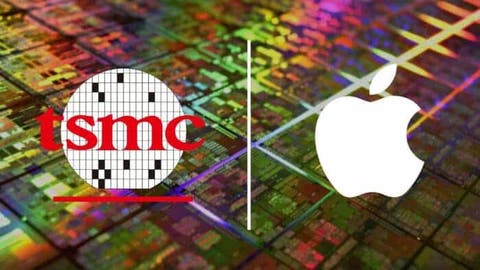TSMC is one of the best chip brands in the world. It has very few rivals like Samsung and other little-known brands. However, we all know that Samsung’s manufacturing process has not been at its best. After the SD8 Gen1, Qualcomm had to switch from Samsung to TSMC for obvious reasons. However, Apple appears to have a very strong grip over TSMC. TSMC recently broke many records. It surpassed its more than three years of quarterly revenue growth year-on-year. However, there is a warning that this year is likely to see its first full-year revenue decline since 2015.
Now, TSMC is all betting on the iPhone 15 series in the second half of the year. If nothing else, the A16 chip of the iPhone 15/15 Plus and the A17 chip of the iPhone 15 Pro/Pro Max will still be exclusive to TSMC. Among them, A17 will be the only 3nm mobile phone chip this year. It will be responsible for most of TSMC’s revenue.
In recent years, with the advancement of manufacturing tech, the cost of processing an advanced chip is also getting higher. Taking TSMC’s revenue in the first quarter of 2023 as a reference, the total revenue brought by 7nm and 5nm accounts for more than half. According to previous analysis, the unit price of 3nm wafers is as high as $20,000. This may be one of the reasons that hinder Qualcomm and MediaTek from launching 3nm mobile phone SoCs until next year. Of course, this will leave only Apple as its major client for the year.
Apple set to claim all of TSMC’s capacity
The partnership between TSMC and Apple has been a double – edged sword. While Apple is TSMC’s largest client, accounting for roughly 23% of its business, the link between the two companies is a symbiotic one. The TSMC – Apple partnership has been one of the defining relationships of the mobile computing era. Without Apple as a predictable, high volume, and demanding client, it is unlikely that TSMC would have been able to catch up to Intel on advanced node semiconductor manufacturing. Similarly, without the support of the TSMC ecosystem, it is unlikely that Apple would have been able to become a pre-eminent chip design house, let alone support the massive manufacturing scale required for its products.
The TSMC – Apple partnership has been beneficial for both brands. Apple has been able to develop some of the most advanced mobile devices in the world, while TSMC has been able to develop new manufacturing processes and techs to meet Apple’s demands.
Apple – TSMC partnership risks
The partnership is not without its risks. Apple’s dominance in the mobile device market means that TSMC is heavily reliant on a single client. This creates a huge amount of risk for TSMC, as any changes in Apple’s demand could have a major impact on its business. TSMC is ahead in terms of its chip manufacturing process. Thus, heavily relying on Apple will not be good for the market. At the moment, Apple is a priority for TSMC. When there are huge price increases, TSMC gives Apple huge subsidies. This means that Apple and the other brands can not be on a level playing field.
Of course, several brands are trying to claim the flagship market from Apple. If their chips are comparatively more expensive, then they are already one step behind in their pursuit. At the moment, it does not feel like a big deal. However, in the future, it may be.
Despite these risks, the TSMC – Apple partnership is likely to continue to evolve. Apple’s move towards developing its own chips could lead to a reduction in its reliance on TSMC. But it is unlikely to sever ties completely. TSMC’s expertise in chip manufacturing is unmatched. Thus, it will likely continue to play a key role in the development of new techs.
Apple – TSMC – the future ahead
The TSMC-Apple partnership is likely to continue to be a defining relationship in the mobile computing era. Apple is TSMC’s largest customer, accounting for roughly 23% of its business1. The partnership has allowed TSMC to assist Apple during the global semiconductor crisis, at least in relation to newer chips1. Apple aims to be the first company to use an updated version of TSMC’s latest chipmaking technology next year, with plans to adopt it for some of its iPhones and Mac computers.
Looking to the future, the TSMC-Apple partnership is likely to continue to evolve. Apple’s move towards developing its own chips could lead to a reduction in its reliance on TSMC, but it is unlikely to sever ties completely. TSMC’s expertise in chip manufacturing is unmatched, and it will continue to play a key role in the development of new technologies1. In addition, TSMC is also working with other major players in the industry, such as AMD and Qualcomm, which will help to diversify its customer base and reduce its reliance on Apple.
Final Words
In conclusion, the TSMC-Apple partnership is a symbiotic relationship that has been beneficial for both companies. As long as Apple continues to demand cutting-edge chips, TSMC will remain a key partner in its supply chain. The partnership is likely to continue to evolve, but it is unlikely to be broken completely. TSMC’s expertise in chip manufacturing is unmatched, and it will continue to play a key role in the development of new technologies. If the likes of Samsung and Intel stay far behind TSMC, this relationship may pose a huge threat to other mobile phone brands.

